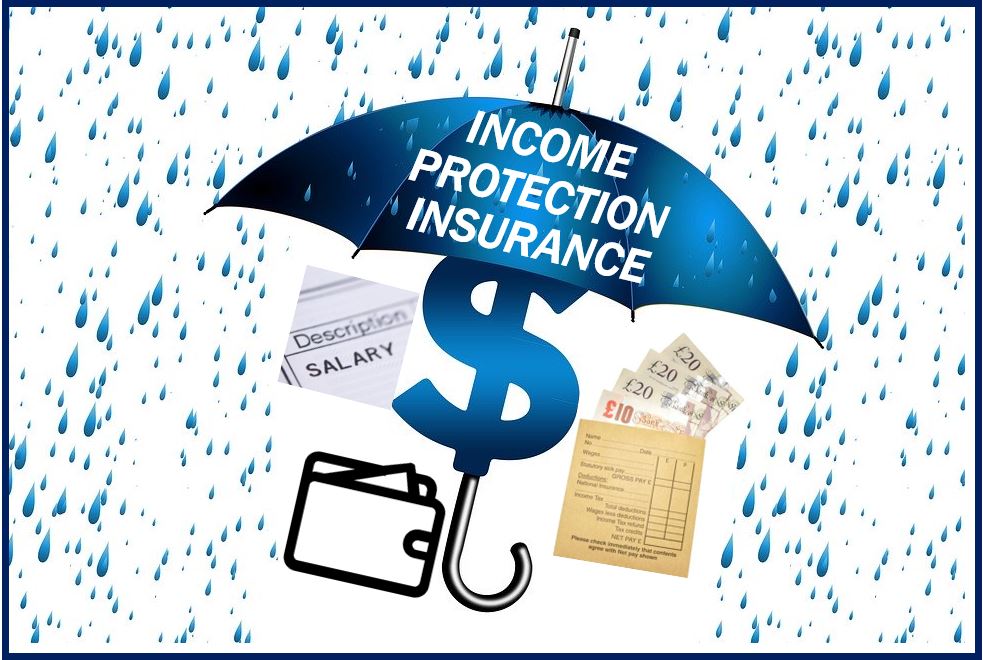Income Protection
- Home
- Income Protection
WHAT IS INCOME PROTECTION?
- Income Protection (also known as Salary Protection) is an insurance policy that pays a monthly replacement Income/income to policyholders who are unable to work due to illness or injury.
- The replacement income starts paying out after a certain period of time. This is called the deferred period. This can range from 4 – 52 weeks and should coincide with any sick pay entitlements associated with your job. (if any)
- An income/Income/sum of money is chosen by the policyholder to insure. This can range from €10,000 per annum (minimum) to a maximum of 75% of Income.
- This Annual income is insured from the start date of the policy to a chosen term (usually the policyholder’s retirement age).
- When off work, this sum of money is paid on a monthly basis until the policyholder either returns to work or reaches the chosen term of the policy (usually on his/her 60th/65th birthday).
- One of the main benefits of Income Protection is that all monthly premiums qualify for tax relief/tax rebate.


HOW DO YOU CORRECTLY QUOTE FOR INCOME PROTECTION?
You are required to choose the following:
- A sum of money to insure (min €10000/max 75% of Income)
- The term you wish to be covered for (usually your 60th/65th birthday)
- The number of weeks that you need to be off work before the policy starts paying out
- Whether or not you smoke (30% price increase for smokers)
- State your Occupation (different pricing for different occupations)
please note
The decisions made/answers given to the points mentioned above will have a direct correlation with the premiums of the policy. For example, some individuals might want to cover themselves for the maximum of 75% of their Income payable after 26 weeks when off work and payable/covered until they retire at age 65. Others might only wish to insure themselves for enough funds to pay their monthly mortgage repayments until their mortgage is paid off at age 60. Another factor that affects the premium is the occupation of the applicant. Some occupations, due to the nature of their work, for example, Construction workers, are more expensive than office administration workers.
Occupations are rated from Class 1 to 4, with four (4) being the most expensive. Some occupations are actually uninsurable and are declined altogether (Firemen/Guards/Paramedics). Please note that occupational classes can differ between the various Insurance companies/providers. One provider’s quoted premium can differ significantly from another due to how their underwritings departments categorise a particular occupation. It’s important to understand these differentiations before choosing a provider/comparing quotations for your Income protection policy.
Please see below the samples of occupations and it’s classes



Income Protection
WHY IS SALARY PROTECTION IMPORTANT FOR PUBLIC SERVANTS
Income Protection is most important when you are young. If you are unable to work for a long-term period or are diagnosed with a serious illness at a relatively young age, who will pay for your mortgage/rent, medicine, bills, children’s education, etc?
In this situation, Income Protection will ensure that you get up to 75% of your salary until your 60th/65th birthday or whichever age you choose. It will allow you to be able to pay your bills and have a decent standard of living, even though you may not be fit enough to work and earn a living.

WHY IS SALARY PROTECTION IMPORTANT FOR PUBLIC SERVANTS
Income Protection contrasts significantly with any other type of cover when comparing the conditions that the policyholder can claim. For example, a serious illness policy will only pay out on a serious illness (Cancer/Cardiac arrest/MS/Parkinson’s, etc). It may in fact only pay out partially for certain cancers/heart conditions.
Income Protection pays out on all illnesses and injuries. It covers stress-related illnesses and any injuries that restrict the policyholder from working (knee/back injury, injuries sustained in an accident that are not classed as a ‘serious illness, etc).
It basically pays out any condition that your doctor will confirm in writing that you are unfit/unable to perform the day-to-day tasks associated with your job.
PREMIUMS AND TAX RELIEF
A huge benefit of income protection, as opposed to any other protection policies (life cover/Personal Accident cover/Serious illness cover), is that the monthly premiums qualify for tax relief. So for example, if you are earning over €36800 per year you are usually paying an income tax of 40%. In this situation, you would be due a tax rebate of 40% of the income protection premium. For example, if say the premium is €100, you would be due back €40 as a tax rebate each month.
other features and benefits
- The policy is owned by you and not part of a group scheme
- The policy also pays an additional hospital Cash payment if you are required to stay overnight in the hospital
- Back-to-work rehabilitation programs (including physio) available for all policyholders
- Free complimentary counseling sessions for the applicant and their families are available
- The premiums are guaranteed and do not increase for the term of the policy
- There is no obligation to be a member of any trade union
- A very high percentage of payout on genuine claims
- You can change jobs throughout your career and keep this policy
HOW THE TAX RELIEF WORKS?
The Gross Monthly Premium is debited from your bank account each month. The tax rebate is added back to your take-home pay on your payslip on a monthly basis.
Once the policy goes live, the relevant insurance provider sends a certificate to the revenue to prove that your policy is now live and this cert instructs them to alter your tax credits accordingly. When this is complete you will receive the relevant tax rebate back in your tax home pay on a monthly basis. You will in effect notice an increase in your take-home pay by the rebate amount once the revenue alters your tax credits.
Please note that it may take 6 weeks or so after your start date before you start receiving your rebate but all tax relief will be backdated and paid in full once your tax credits are adjusted etc.
WHAT INSURANCE COMPANIES PROVIDE INCOME PROTECTION FOR PUBLIC SERVANTS?
Most of the main insurance companies provide cover income protection cover for public servants (Aviva, Zurich, Irish Life, Royal London, New Ireland). We compare all provider’s income protection offer to public servants in relation to:
- Cheapest premium
- The price discounts available by each company at that particular time
- Additional other free benefits that each provider offer (eg, Best Doctor/Family Care and Helping Hand/Hospital Cash/Return to work rehabilitation, etc)
Once we compare all the above points, we will recommend the most suitable provider with the cheapest premiums for your income protection policy.
Trustindex verifies that the original source of the review is Google. My wife and I had a very positive experience dealing with Mayank and Olga from Money Maximising. We'd like to thank them for their knowledge, professionalism and support.Posted onTrustindex verifies that the original source of the review is Google. I had a really positive experience dealing with Money Maximising Advisors Limited. Everything was explained clearly, the process was smooth, and I always felt well informed. Lorna was quick to respond to any questions I had. It made what can often feel like a complicated process very straightforward. Highly recommended.Posted onTrustindex verifies that the original source of the review is Google. I just got my remortgage through money Maximising with the help of Kavita,Maricris and Joy and I can't thank them enough. They were very helpful at the start and guided me throughout the process in a very professional and knowledgeable manner and were very prompt with email and telephone queries. They made the process very seamless and I'm definitely using them again in the future for all my financial needs..Posted onTrustindex verifies that the original source of the review is Google. I recently met and worked with Money Maximising Advisors and found Lorna & Anastasia to be exceptionally professional, knowledgeable, and efficient. Lorna provided clear guidance & insightful advice that helped me improve my investment options. I will definitely be returning in the future for further input and guidance on maximising my pension. Many thanks to the entire team for their support.Posted onTrustindex verifies that the original source of the review is Google. I remortgaged an investment property in 2025 with MM Advisors, I couldn't express highly enough how happy I was with the entire experience, the professionalism shown by Sean, Cris and Byran went above and beyond their duties. I would highly recommend your service to colleagues and friendsPosted onTrustindex verifies that the original source of the review is Google. Lovely to deal with, very good at keeping you in the loop. Highly recommend Cris and JackPosted onTrustindex verifies that the original source of the review is Google. I had a wonderful experience with Money Maximising Advisors Limited. They provided advice on the mortgage that best suited my needs and were very quick to respond to any queries. I would highly recommend their services.Posted onTrustindex verifies that the original source of the review is Google. Highly recommend Money Maximising Advisors. They helped us achieve our remortgage goals with good advise, constant updates and mortgage provider options. I'll recommend MMA to my friends & family who need money advice.Posted onTrustindex verifies that the original source of the review is Google. Trustable firm. Response time is quick. Clears each doubts thoroughly. Good listeners and Gives advice with multiple options. I bought mortgage protection from them with excellent rates.
Get in touch with us
To schedule a call with one of our Qualified Financial Advisors.
